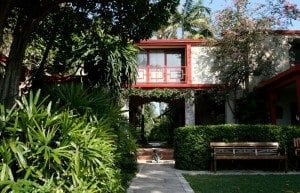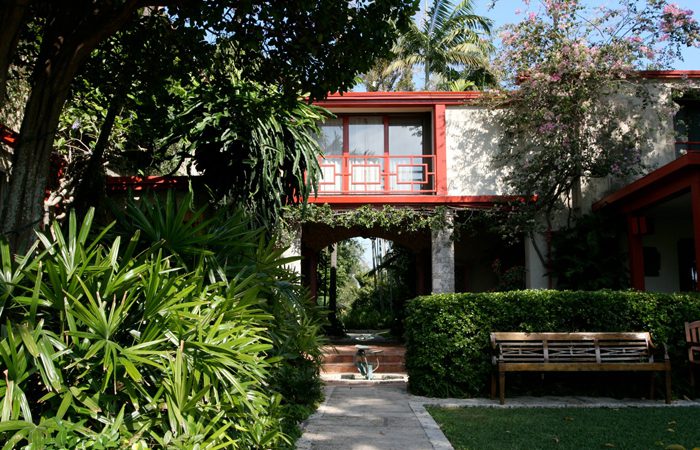 Nestled within the lush tropical foliage of The Kampong resides 20 avocado trees. They were planted nearly 100 years ago under the supervision of plant explorer David Fairchild. Though historically significant, they are not immune to modern day pests and diseases.
Nestled within the lush tropical foliage of The Kampong resides 20 avocado trees. They were planted nearly 100 years ago under the supervision of plant explorer David Fairchild. Though historically significant, they are not immune to modern day pests and diseases.
The Kampong, located in Coconut Grove, Fla., is the historic estate of Fairchild and now owned by the National Tropical Botanical Garden (NTBG). It is NTBG’s only garden outside of Hawaii. It is also home to FIU’s International Center for Tropical Botany. So when staff noticed some of the trees didn’t seem quite right, they began investigating.
Their suspicions turned to laurel wilt, a deadly vascular disease caused by a fungus that is carried by the invasive Redbay ambrosia beetle. Currently, the disease is having devastating effects on avocado groves throughout South Florida, with more than 90 percent of trees dying within six weeks of infection. Nearly 10 percent of South Florida’s avocado trees have been lost to infection. Detection is a major challenge. Diseased trees can begin to wilt within two weeks, and by the time symptoms are visible, the fungus has likely spread to nearby trees.
In the case of the Kampong trees, the concern is different than that of commercial growers who rely on the plants to make a living. The Kampong trees are part of agriculture history in the United States. Fairchild’s charge in the 1920s was to find plants that could feed America’s population. Among the many plants he cultivated at The Kampong were avocados. He brought several varieties to South Florida and grafted some.
When laurel wilt was suspected in some of the trees over the summer, Kampong Interim Director Mike Maunder knew who to call. As associate dean of research engagement in FIU’s College of Arts & Sciences, Maunder is very attuned to the work being done by a team of researchers in FIU’s International Forensic Research Institute to combat laurel wilt. Biologist DeEtta Mills along with Provost — and chemist — Kenneth G. Furton are leading a unique detection program that deploys specially trained canines to detect laurel wilt before symptoms are visible.
At the request of Maunder, the dogs were deployed at The Kampong. The canines alerted to several avocado trees on the property. By identifying the cause of distress early, the staff was able to act quickly and begin treatment. While not all of The Kampong’s 20 trees were infected, the decision was made to treat all of them in hopes of preventing a further outbreak.
“These are historic specimen trees from the 1920s that we now hope to keep that otherwise we might have lost,” Maunder said. “These are part of the history of American agriculture and in particular the history of fruit growing in South Florida. These are some of the earliest avocado trees in Miami-Dade County.”
Currently, the treatment seems to be working and Maunder is hopeful the trees will survive. While only time will tell, he knows the odds are in their favor thanks to the keen observations of those working at The Kampong and the even keener noses of the dogs.






